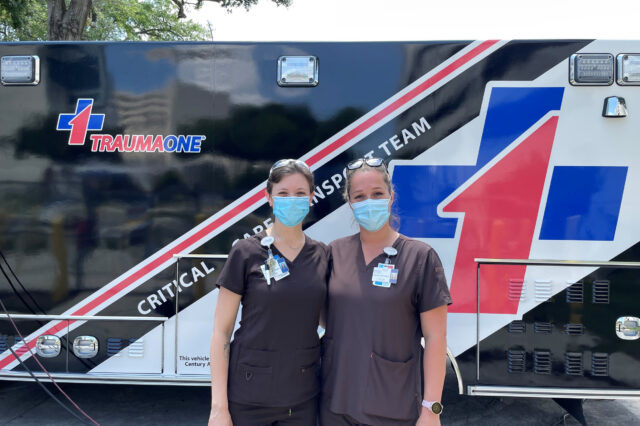Speech-Language Pathology Spotlight: Trauma
A trauma speech-language pathologist, or SLP, provides direct care for individuals who have been involved in a traumatic event that impacts their speech, language, cognition or swallowing abilities.

We continue celebrating Better Speech and Hearing Month by sharing how speech therapy benefits patients who’ve experienced trauma.
A trauma speech-language pathologist, or SLP, provides direct care for individuals who have been involved in a traumatic event that impacts their speech, language, cognition or swallowing abilities. SLPs provide various types of therapy focusing on rebuilding patients’ abilities to communicate, improving thought processing for activities of daily living and safely consuming food and drinks.
At UF Health Jacksonville, trauma SLPs work with patients of all ages and see patients in the emergency room and in the intensive care unit, or ICU. They treat patients who’ve had any injuries affecting their head or neck.
What types of patients do trauma SLPs support?
- Adult patients in the emergency room. One example is a patient admitted to the emergency room following a motor vehicle crash and has confusion. His head CT scan is clear; however, nurses have noticed this patient is extremely forgetful and are concerned he experienced a concussion. The SLPs complete a cognitive assessment to evaluate aspects such as orientation, attention, short term memory and ability to problem solve and sequence. SLPs will either recommend the need for continued speech therapy, treatment from other health care professionals or a specific degree of supervision when discharged home.
- Pediatric patients in the emergency room. An example is a pediatric patient who was admitted to the emergency room following a head injury after crashing an ATV without a helmet on. A cognitive evaluation was requested following the injury to determine if the patient has any cognitive deficits and see if there is a need for special accommodations upon returning to school.
- Patients on the trauma floor with cognitive issues. An example is a geriatric patient who is admitted to the trauma unit following a ground level fall resulting in a severe brain injury. The patient is extremely lethargic, has difficulty following commands and becomes agitated in response to any stimuli. SLPs complete a cognitive evaluation and focus on reorienting the patient, keeping the patient alert and improving their comprehension.
- Patients on the trauma floor with dysphagia. An example is a middle-aged woman admitted for a C4-6 fracture of her neck which required surgery. This surgery resulted in dysphagia, or difficulty swallowing, due to swelling surrounding the areas of the surgery. SLPs completed a swallow evaluation revealing significant difficulty swallowing. The recommendation was for her to remain NPO, meaning no food, drinks or medications consumed by mouth.
- ICU patients. An example is a 25-year-old male who was admitted to the ICU following multiple gunshot wounds, which unfortunately resulted in a severe spinal cord injury. He had a tracheostomy placed in his neck and was connected to a ventilator. SLPs are then consulted to trial ways to improve his ability to communicate.
The SLPs first introduce a communication device, which has the capability to track a patient’s eye and select words or phrases based on prolonged gaze interaction. The patient uses this device and indicates pain.
Once the patient progresses and lungs improve, SLPs then introduce a one-way speaking valve, which can be used both on and off the ventilator. With the speaking valve in place, the patient is finally able to talk.
Once the patient is off the ventilator, the SLPs complete a swallow evaluation.
Meet our trauma SLPs
Elizabeth Kreichelt has been with UF Health Jacksonville for seven years. She has a passion for treating patients with traumatic brain injuries and concussions. She was also involved in raising money to purchase a state-of the-art communication device through UF Health TraumaOne’s Annual A Night for Heroes event in 2019.
Julie Speulda has been with UF Health Jacksonville for two years. She has a passion for treating those with spinal cord injuries. She loves introducing speaking valves to trauma patients.
Visit UFHealthJax.org/rehabilitation-services to learn more about speech therapy and other services offered at UF Health.
About the author
